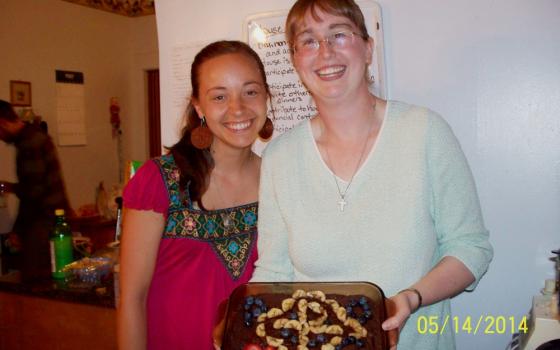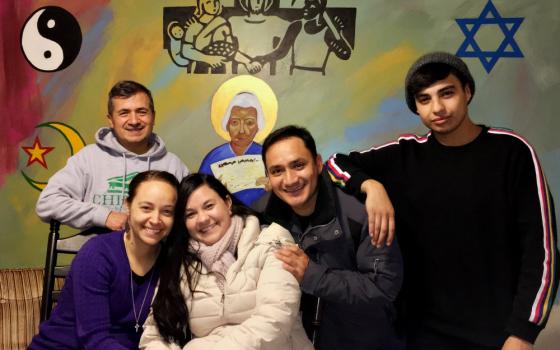From the time I first connected with the Indianapolis Catholic Worker House of the Little Flower in 2013, I was taken by the creative growth and expanding circles of community that happen when a group of people from different walks of life gather around values of inclusion, hospitality and simple living.
At that time, my own circles of community also included living with my younger sister for the first time as an adult, and regular meals and sharing with a Sister of Providence discernment guide as I explored how this longing might take shape in a commitment to vowed religious life.
I distinctly remember my first conversation on the phone with a member of the Catholic Worker community when I inquired about visiting or even living in the house. Soon after he found out I was discerning vowed religious life, this community member's tone turned cautionary: "Just so you know, there may be people in the house who curse, who smoke, who have tattoos, maybe some who have criminal records." Then an awkward silence.
I responded that I understood and that to me those were not barriers to relationship. I remember feeling sad that sharing about my discernment to become a sister elicited that response in him. Where did an apostolic life following Jesus — who dined on the regular with prostitutes and tax collectors — get lost in translation? What did this say about the path I was discerning, about how sisters are known in the broader community?
I learned over time that he was not the only one in the community who had this reaction about a sister-to-be joining the ranks of the motley Catholic Worker crew.
Even so, I was determined to show up the best I could as Gospel hospitality to break down stereotypes my new community mates had about me, even as I broke down my own stereotypes about them.
Over the following 12 months, I invited Sisters of Providence to our weekly Catholic Worker dinners, invited Catholic Worker community members over to our apartment for weekly prayer, and answered countless questions about being a sister and about the formation process.
I shared contemplative silence with organizers and neighbors who became friends. I trained for a half marathon with a Catholic Worker community member who later joined our Sisters of Providence community. We celebrated my friend Sister Arrianne's first vows at the House of the Little Flower with vegan brownies.
And all the while, this experience of sharing community with people from different spiritualities, different professions and trades, different races and ages, different gender expressions and personalities: It got under my skin. It pushed me to imagine ever-widening circles of community and wonder how this broadening might translate to religious life.
The tension I experienced in that first conversation with a member of the Catholic Worker community and the questions it prompted have continued to pulse through me throughout my formation years. I have struggled with the remnants of the cloistered feel that apostolic communities like mine took on in the mid-1900s and can't seem to fully shake. I have committed myself through the vow of celibacy to love broadly, and yet regularly hear apologies from people who are afraid to offend me by showing up as their full selves in front of a sister.
I have learned and grown in countless ways as I've lived with nine individual sisters in three different Sisters of Providence local communities over the past four years.
Simultaneously, this nudge toward ever-widening circles of community has continued; so much so that I discerned to seek out deeper connection with the Catholic Worker House of the Little Flower once again, this time as a live-in community member.
I reflected on this possibility with my Sisters of Providence community leadership and the House of the Little Flower. Last month, our collective discernment came to a conclusion that moving to the House of the Little Flower was the next right thing for me.
So now I share a home with seven individuals ranging in age from 3 months to 59 years, some who have lived in the house for over a year, some who moved in just a couple weeks ago. I bring with me both the tools to live intentionally with others that I've honed during my Sisters of Providence formation, as well as a curiosity about what this new form of community will teach me.
I wonder how this space and these people will help me answer the questions on my heart about community and radical Gospel life. Questions like: How can we vowed women and men religious re-create the energy surrounding our commitment so that rather than being known primarily as ruler-wielding legalists, we might be rumored, like Jesus, to show up like Gospel hospitality in places our dominant culture finds uncomfortable or unseemly? Where are those places today? What interior shifts would it take for these places to become home to us, rather than an anomaly?
My community's yes to this exploration is, to me, a sign of our collective openness to these questions and this unfolding. And I know that what is unfolding now has been unfolding since that phone conversation in 2013 and even before.
As I sat around the table preparing for our house meeting last week, just minutes after moving my belongings into my new abode, the same community member who had expressed hesitation on the phone those years ago walked through the door. As he took in three of us younger Sisters of Providence unpacking and chatting, he commented with a grin, "Looks like this house has become the new Sisters of Providence formation house!"
I nodded my head. Yes, I thought. Who I am — and by default who we are — will continue to be formed here.
[Tracey Horan is a member of the Sisters of Providence of St. Mary-of-the-Woods, Indiana. Her first deep conversation with this community occurred in a melon patch during her time as an intern at the Sisters' White Violet Center for Eco-Justice. She is a community organizer with Faith in Indiana (formerly IndyCAN).]



